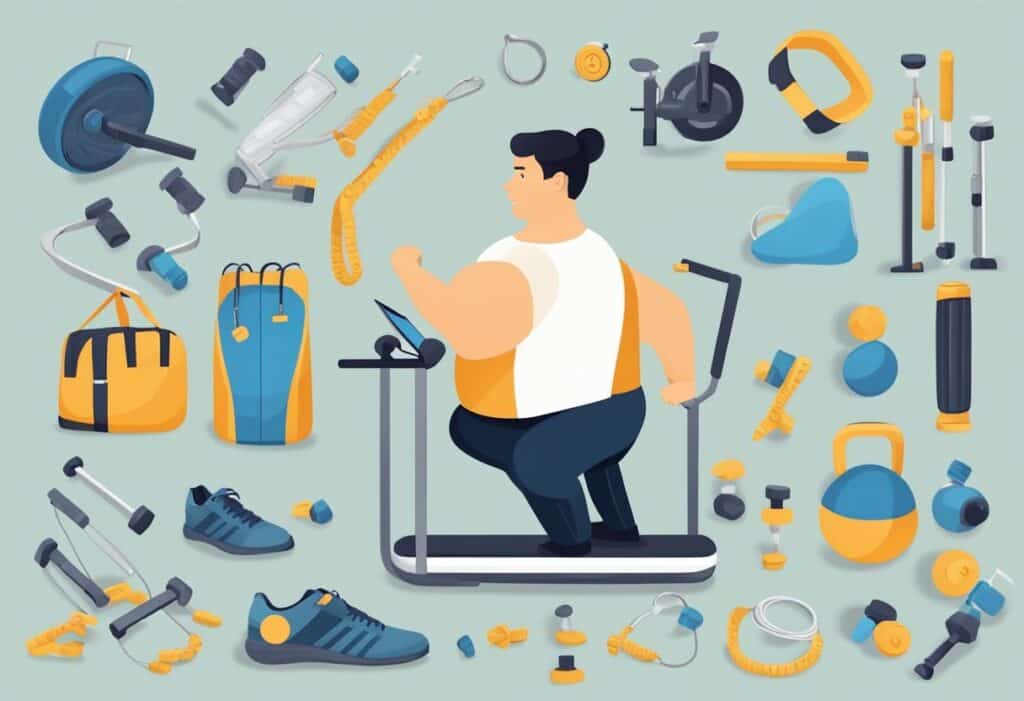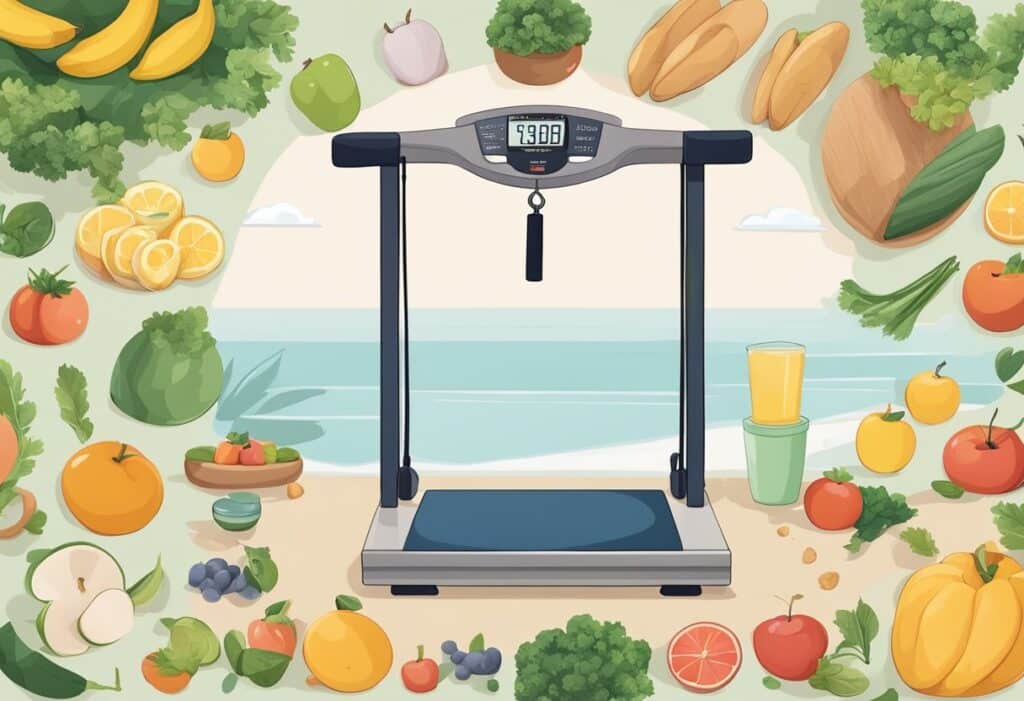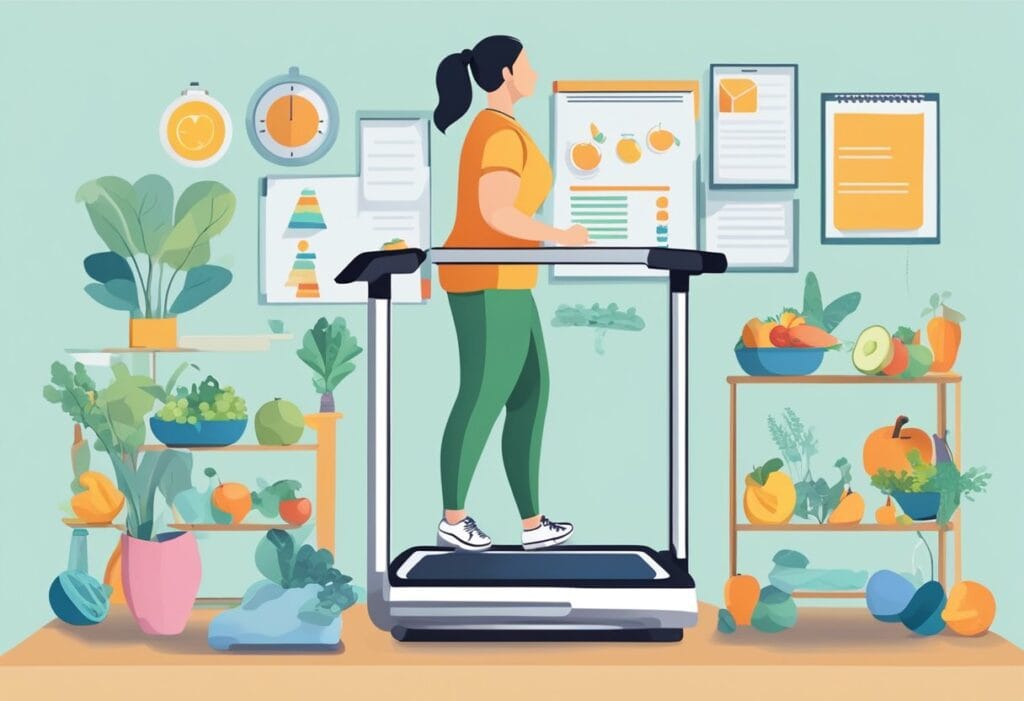Are you feeling stuck in your weight loss or fitness journey? Have you hit a plateau and don’t know how to break through it? Don’t worry, we’ve all been there. Plateaus are a common occurrence in weight loss and fitness progress, and they can be frustrating. However, with the right strategies and mindset, we can overcome them and continue to make progress towards our goals.

In this article, we will explore the various factors that contribute to weight loss plateaus, including our expectations and nutritional and physical activity habits. We will also provide practical tips and lifestyle adjustments to help you break through your plateau and continue to make progress. By the end of this article, you will have a better understanding of how to overcome plateaus in weight loss and fitness and be equipped with the tools to reach your goals.
Key Takeaways
- Plateaus are a common occurrence in weight loss and fitness progress, and they can be overcome with the right strategies and mindset.
- Nutritional strategies, exercise enhancements, and lifestyle adjustments are all effective ways to break through a plateau.
- Tracking progress and setting realistic goals are essential for continuous improvement and avoiding future plateaus.
Overview
Understanding Weight Loss Plateaus
Defining a Plateau
A weight loss plateau is a period of time during a weight loss journey when the scale stops moving. Despite our best efforts, we are no longer seeing progress. We may still be following our diet and exercise routine, but the number on the scale remains the same.
A plateau can last for a few days or several weeks. It can be frustrating and demotivating, but it is a normal part of the weight loss process. It is important to understand that a plateau does not mean that we have failed or that our efforts are in vain.
Common Causes
There are several common causes of weight loss plateaus, including:
- Calorie Intake: Our bodies adjust to a lower calorie intake over time, which can slow down weight loss progress. We may need to adjust our calorie intake to continue to see results.
- Metabolism: A slower metabolism can also contribute to a plateau. As we lose weight, our metabolic rate can decrease, making it harder to burn calories. Building muscle through strength training can help increase metabolism.
- Calorie Deficit: We may have reached a point where our calorie deficit is no longer sufficient for weight loss. We may need to increase our calorie deficit by reducing our calorie intake or increasing our physical activity.
- Metabolic Adaptation: Our bodies can adapt to our diet and exercise routine, making it harder to lose weight. We may need to change up our routine to keep our bodies guessing.
In order to overcome a weight loss plateau, it is important to identify the cause and make adjustments accordingly. By making small changes to our diet and exercise routine, we can jumpstart our weight loss progress and continue on our journey towards our goals.
Nutritional Strategies to Overcome Plateaus
When it comes to weight loss and fitness, nutrition plays a critical role. Making the right nutritional choices can help you overcome plateaus and reach your goals. Here are some nutritional strategies that can help you overcome plateaus:
Adjusting Caloric Intake
One of the most effective ways to overcome a weight loss plateau is to adjust your caloric intake. When you lose weight, your body requires fewer calories to maintain its weight. Therefore, you need to adjust your caloric intake to continue losing weight. However, reducing your caloric intake too much can be counterproductive. A low-calorie diet can slow down your metabolism, making it harder to lose weight. Therefore, it is essential to find the right balance between caloric intake and weight loss. To determine your optimal caloric intake, you can use a calorie calculator or consult a registered dietitian.
Balancing Macronutrients
Balancing macronutrients is another critical strategy for overcoming plateaus. Macronutrients are the three major nutrients that provide energy: carbohydrates, proteins, and fats. Each macronutrient has a different effect on your body. For example, protein has a higher thermic effect than carbohydrates and fats, which means that your body burns more calories digesting protein. Therefore, increasing your protein intake can help you overcome a weight loss plateau. Additionally, consuming fiber-rich foods such as beans and whole grains can help you feel fuller for longer, reducing your overall caloric intake.
Meal Timing and Frequency
Meal timing and frequency can also play a role in overcoming plateaus. Some studies suggest that eating smaller, more frequent meals can help boost your metabolism and promote weight loss. However, other studies have found that meal frequency does not affect weight loss. Therefore, it is essential to find a meal timing and frequency that works for you. Additionally, consuming a healthy diet that includes whole foods can help you overcome plateaus by providing your body with the nutrients it needs to function optimally.
By adjusting your caloric intake, balancing macronutrients, and optimizing your meal timing and frequency, you can overcome plateaus and reach your weight loss and fitness goals.
Exercise and Physical Activity Enhancements

When it comes to overcoming plateaus in weight loss and fitness, exercise and physical activity enhancements can be incredibly effective. Here are some key ways to enhance our workouts and physical activity to help break through plateaus.
Increasing Intensity
One of the most effective ways to overcome a plateau is to increase the intensity of our workouts. This can be achieved by increasing the weight we lift, the distance we run, or the number of reps we do. By increasing the intensity of our workouts, we can challenge our bodies and force them to adapt, which can lead to increased muscle mass, improved calorie burn, and improved overall fitness.
Incorporating Variety
Another effective way to break through a plateau is to incorporate variety into our workouts. This can include trying new exercises, changing the order of our workouts, or using different equipment. By incorporating variety into our workouts, we can challenge our bodies in new and different ways, which can help to break through plateaus and improve our overall fitness.
Interval Training Benefits
High-intensity interval training (HIIT) is another effective way to break through plateaus and improve our fitness. HIIT involves short bursts of high-intensity exercise followed by periods of rest or low-intensity exercise. This type of training can help to improve our cardiovascular fitness, increase our calorie burn, and improve our overall fitness.
In addition to these enhancements, it’s important to remember the importance of non-exercise activity thermogenesis (NEAT) and moving more throughout the day. By incorporating more physical activity into our daily lives, we can improve our overall fitness and help to break through plateaus in weight loss and fitness.
Lifestyle Adjustments for Continuous Improvement

When it comes to weight loss and fitness, we often focus on diet and exercise, but lifestyle factors such as stress, sleep, and hydration are just as important. Making small adjustments to our daily routine can help us overcome plateaus and achieve our goals.
Stress Management
Stress can have a significant impact on our weight loss and fitness journey. When we are stressed, our body releases cortisol, a hormone that can increase hunger and fat storage. To manage stress, we can try relaxation techniques such as meditation, deep breathing, or yoga. We can also make time for activities we enjoy, such as reading a book, listening to music, or spending time with loved ones.
Sleep Quality
Getting sufficient sleep is crucial for weight loss and fitness. Lack of sleep can lead to increased hunger, decreased energy, and slower metabolism. To improve sleep quality, we can establish a regular sleep schedule, avoid caffeine and alcohol before bed, and create a relaxing sleep environment.
Hydration and Dietary Choices
Staying hydrated is essential for weight loss and fitness. Drinking water can help us feel full, reduce cravings, and improve digestion. We can also make dietary choices that support our goals, such as meal planning and consulting with a registered dietitian.
In conclusion, making small lifestyle adjustments can have a significant impact on our weight loss and fitness journey. By managing stress, improving sleep quality, and making healthy dietary choices, we can overcome plateaus and achieve our goals.
Tracking Progress and Setting Realistic Goals

Losing weight and improving fitness is a journey that requires patience, perseverance, and a realistic plan. It is essential to track progress and set realistic goals to avoid plateaus and stay motivated. Here are some tips to help you monitor changes, adjust expectations, and seek professional advice.
Monitoring Changes
Tracking your progress is crucial to identify areas that need improvement and celebrate milestones. The Centers for Disease Control and Prevention (CDC) recommends keeping a record of your weight, body mass index (BMI), and waist circumference. You can also use fitness apps, wearable devices, or a journal to monitor your physical activity, food intake, and mood.
Adjusting Expectations
Losing weight and improving fitness is not a linear process. Your body adjusts to changes, and plateaus are normal. It is essential to adjust your expectations and focus on long-term weight loss and lean body mass. The CDC recommends aiming for a healthy weight loss of 1-2 pounds per week and at least 150 minutes of moderate-intensity aerobic activity per week for adults.
Seeking Professional Advice
If you experience a prolonged plateau or have concerns about your fitness level, it is essential to seek professional advice. A registered dietitian can help you create a personalized meal plan that meets your nutritional needs and supports your weight loss goals. A certified personal trainer can help you design a safe and effective exercise program that challenges your body and prevents injuries.
In summary, tracking progress and setting realistic goals are essential to overcome plateaus in weight loss and fitness. Monitoring changes, adjusting expectations, and seeking professional advice can help you stay on track and achieve long-term success.










